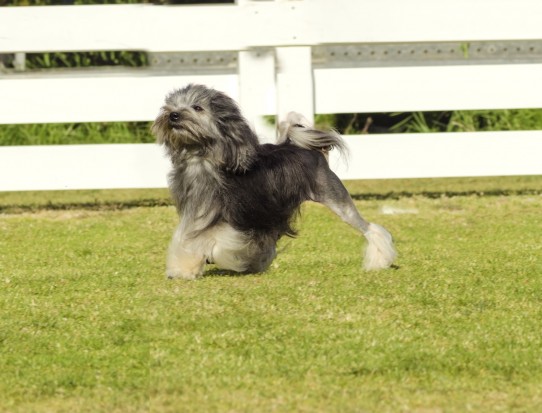

The Löwchen/Lowchen or “little lion dog” is a small toy dog breed that was at one point classed as the rarest dog breed in the world, and during the 1970’s, there were less than 100 dogs of the breed extant in total. While the breed is not quite so scarce today, they still remain relatively uncommon, and potential Lowchen owners may have to wait some time and travel some distance to find a Lowchen dog or puppy for sale.
The Lowchen stands up to 14” tall at the withers and can weigh up to 8kg, with females tending to be smaller than males. They have short, wide muzzles with broad skulls, and bright, alert and lively eyes. Their coats can be seen in virtually any colour, and is very long and flows downwards from the body. The coat of the breed is wavy rather than straight or curly, and consists of a mixture of fine and thick hairs, leading to a coat that is neither harsh nor soft in texture.
The coat of the breed also sheds very lightly, and as such, they are often classed as a hypoallergenic dog, or one that is more suitable than most for people who have a tendency to be allergic to dogs.
If you have your heart set on owning a Lowchen dog and are prepared to wait for the right one to become available, it is wise to use the time in the interim to find out as much about the breed as you can, so that you will be all set for ownership when the time comes. This includes finding out about the hereditary health and general wellness of the breed, which we will cover in more detail within this article.
The average lifespan of the Lowchen dog is 12-14 years, which is towards the top of the average range across the board for all dog breeds of a similar size and build.
The coefficient of inbreeding statistic for the Lowchen is 18.6%, which is considered to be a very high figure that reflects the degree of inbreeding that commonly occurs across the breed. While this is to some extent necessary in order to keep the breed viable, due to the small number of dogs of the breed in the UK, this level of inbreeding can contribute to health problems such as smaller litter sizes, and hereditary health issues.
The accepted range for the coefficient of inbreeding across the board is 6.25% or lower, and Lowchen breeders are advised to reduce the figure within their own breed lines where possible.
Due to the prevalence of a couple of hereditary health conditions across the breed as a whole, The Kennel Club and the British Veterinary Association recommends health testing for certain conditions prior to breeding. Currently running health schemes for the Lowchen dog are:
Aside from the hereditary problems listed above that can be screened for prior to breeding, the Lowchen dog is also known to have a tendency to a few other health issues, but for which no pre-breeding screening is currently offered. These conditions are:
Despite the significant degree of inbreeding that tends to occur across the breed, the fact that the health problems affecting the breed are not numerous and the lifespan of the dog is relatively long indicates that the breed does tend to be fairly healthy overall.
While the four conditions outlined above cannot usually be identified prior to breeding, if you are considering buying a Lowchen puppy from a breeder, talking to the breeder about the health of the parent and grandparent dogs of the line can help to identify the likelihood of any future problems.
If either of the parent dogs or any of the grandparents were afflicted with any of the mentioned health conditions, there is a heightened chance that the puppies will also develop the condition, and knowing more about this can help you to make an informed decision on a purchase.
Copyright © 2005-2016 Pet Information All Rights Reserved
Contact us: www162date@outlook.com